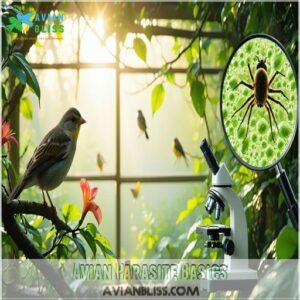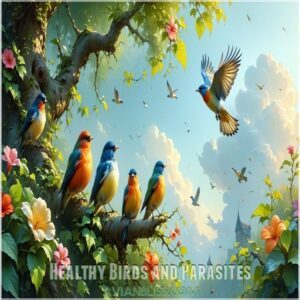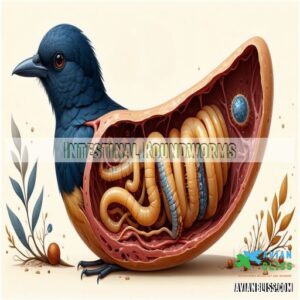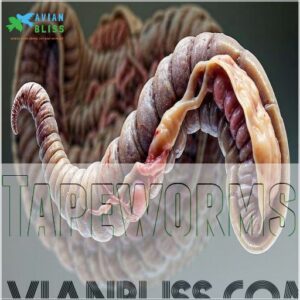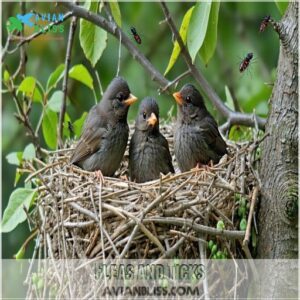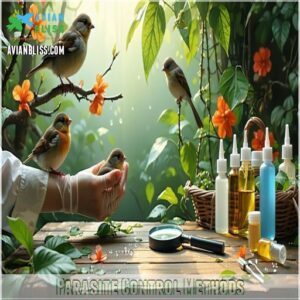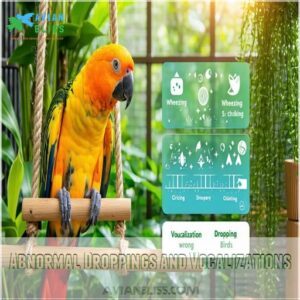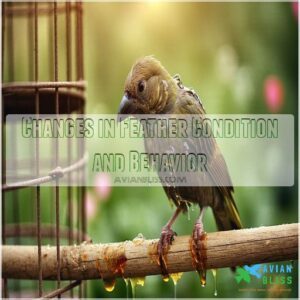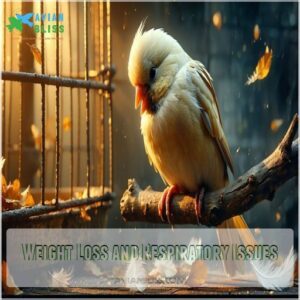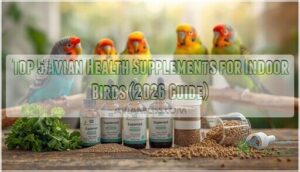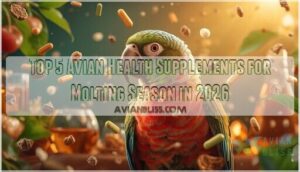This site is supported by our readers. We may earn a commission, at no cost to you, if you purchase through links.
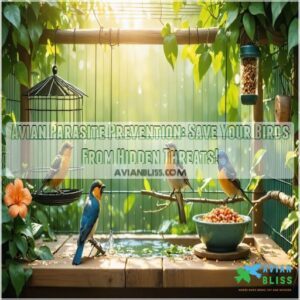 Preventing avian parasites starts with proper hygiene and attention to your bird’s environment. Clean cages, perches, and feeding areas regularly, as these spaces can harbor ectoparasites like mites or lice. Fresh food and water should be provided daily to limit contamination, and spills should be cleaned promptly.
Preventing avian parasites starts with proper hygiene and attention to your bird’s environment. Clean cages, perches, and feeding areas regularly, as these spaces can harbor ectoparasites like mites or lice. Fresh food and water should be provided daily to limit contamination, and spills should be cleaned promptly.
Watch for signs of infestation, such as feather loss, abnormal droppings, or behavioral changes. Quarantine new or sick birds to avoid parasite transmission, and consider using vet-approved dewormers or insecticidal sprays when necessary.
A balanced diet and stress-free environment also improve your bird’s defenses. Prevention is easier than treatment—consistent care makes all the difference!
Table Of Contents
- Key Takeaways
- Avian Parasite Basics
- Healthy Birds and Parasites
- Common Avian Parasites
- Prevention Strategies
- Parasite Control Methods
- Avian Disease Management
- Recognizing Parasite Infestation
- Treating Avian Parasites
- Maintaining a Healthy Environment
- Monitoring and Responding to Outbreaks
- Frequently Asked Questions (FAQs)
- What are avian parasites?
- What are the chances of dying from a parasite?
- How can a healthy animal cope with a minor parasite load?
- How do you treat avian trichomoniasis?
- How do you prevent worms in birds?
- Can birds recover from avian trichomoniasis?
- How to prevent parasites in birds?
- What can I give my chickens to prevent parasites?
- What is the safest parasite prevention for dogs?
- What is the best way to prevent parasites?
- Conclusion
Key Takeaways
- Keep your bird’s environment clean—disinfect cages, perches, and feeding areas regularly to prevent parasites like mites and lice.
- Watch for signs of infestation, such as feather loss, behavioral changes, or abnormal droppings, and seek veterinary care immediately if needed.
- Provide a balanced diet and reduce stress to strengthen your bird’s immune system against parasitic threats.
- Quarantine new or sick birds and use vet-approved dewormers or insecticidal sprays as preventive measures.
Avian Parasite Basics
You’ll encounter diverse parasites that can silently threaten your birds’ health, ranging from microscopic intestinal invaders to external skin and feather pests.
Understanding these parasites‘ life cycles, transmission routes, and potential impacts is essential for maintaining your avian companions’ wellness and preventing potentially devastating infestations.
Types of Avian Parasites
Knowledge is your first line of defense regarding avian parasites. Birds can host a variety of parasites, including ectoparasites like feather lice and mites, and endoparasites such as intestinal worms. These tiny invaders range from external beak and skin parasites to internal digestive system hitchhikers.
Understanding their classification helps bird owners protect their feathered friends effectively.
To provide proper bird first aid, it’s important to recognize the signs of parasite infestation and take immediate action to prevent the spread of disease.
Life Cycle of Parasites
A parasite’s lifecycle unfolds like a strategic invasion, progressing through distinct egg, larva, and pupa stages.
These intricate parasitic stages involve complex hostparasite interactions, leveraging transmission routes that exploit vulnerabilities in your bird’s defense mechanisms.
Understanding the parasite life cycle is essential for effective prevention and control methods. Understanding these nuanced parasite transmission pathways helps you anticipate and interrupt their potentially devastating journey through an avian ecosystem.
Signs of Parasite Infestation
How can you spot a sneaky parasite invasion in your feathered friends? Watch for telltale signs like abnormal droppings, unusual vocalizations, and changes in feather condition.
Dropping changes, decreased activity levels, and appetite shifts might signal trouble.
Check for skin irritation and behavioral changes that could reveal a hidden parasite infestation lurking beneath the surface.
Healthy Birds and Parasites
You’ll be surprised to learn that your birds aren’t helpless against parasites—they’ve got natural defenses that can keep these tiny invaders at bay.
By understanding how your feathered friends manage parasites through behavioral and physiological strategies, you can support their health and prevent potential infestations.
Behavioral Means of Control
Birds use clever behavioral tactics to fight parasites. By preening thoroughly, sunbathing, and dust bathing, they naturally remove unwanted hitchhikers. Grooming behaviors help birds keep each other clean, reducing parasite risks.
Recognizing sick bird signs is important for maintaining a healthy flock.
Avoiding contact with sick birds and maintaining strict hygiene practices act as first-line defense mechanisms against potential infestations.
Physiological Means of Control
Your bird’s immune system is a fortress, deploying sophisticated physiological defenses against parasitic invaders. Antibody production and metabolic changes work silently to neutralize threats, while hormonal regulation supports gut microbiome balance.
Through preening, sunbathing, and maintaining ideal feather condition, birds naturally combat potential parasitic challenges with remarkable biological precision.
Impact of Stress on Parasite Load
Physiological defense mechanisms can only go so far when stress takes center stage. Elevated stress hormones create a perfect storm for parasite proliferation, weakening your bird’s immune response.
Watch for these telltale stress signs:
- Sudden changes in bird behavior
- Reduced appetite and lethargy
- Excessive feather picking
- Increased vocalization or withdrawal
- Compromised environmental conditions
Implementing stress reduction strategies becomes your bird’s lifeline against silent parasitic threats.
Common Avian Parasites
As a bird owner, you’ll want to understand the silent threats that could be lurking in your feathered friend’s environment.
Common avian parasites like roundworms, tapeworms, fleas, and ticks can compromise your bird’s health.
Early detection and prevention are essential for maintaining their well-being.
Intestinal Roundworms
Intestinal roundworm infestations are silent invaders that can wreak havoc on your bird’s health. These nematode endoparasites spread through contaminated droppings, food, and water, making transmission frustratingly easy.
Watching for symptoms like weight loss, diarrhea, and poor nutrient absorption is essential.
Veterinary diagnosis and targeted treatment can effectively combat these persistent parasitic hitchhikers, protecting your feathered friend’s well-being.
Tapeworms
Tapeworm troublemakers can turn your bird’s digestive tract into a battleground of unwelcome guests. These pesky cestodes hijack nutrients, causing silent but serious health challenges.
Here’s what you need to know:
- Tapeworms spread through infected insects or contaminated food sources.
- Diagnosis requires careful veterinary fecal examination.
- Targeted deworming medications can effectively interrupt their lifecycle.
Stay vigilant and protect your feathered friends from these microscopic invaders.
Fleas and Ticks
Nearly every bird owner’s nightmare involves tiny, blood-sucking parasites like fleas and ticks that can turn your feathered friend’s life upside down. Understanding these external invaders is important for protecting your bird’s health.
| Parasite Type | Prevention Strategy |
|---|---|
| Fleas | Regular environmental cleaning |
| Ticks | Species-specific treatments |
Implementing targeted control measures can help you stay one step ahead of these persistent pests.
Prevention Strategies
You’ll want to protect your feathered friends from parasitic invaders by implementing strategic prevention techniques that target their environment and health.
By maintaining proper hygiene, providing balanced nutrition, and reducing stress, you can create a formidable defense against these silent threats to your birds’ well-being.
Proper Hygiene and Sanitation
After battling pesky parasites from our feathered friends’ previous encounters, it’s time to arm yourself with exceptional sanitation protocols. Your bird’s health hangs in the balance.
Keep their world pristine with these killer cleaning methods: Recognizing respiratory issues is essential for maintaining overall bird health.
- Disinfect cages and perches weekly using avian-safe solutions
- Manage waste immediately to prevent parasite breeding grounds
- Wash hands thoroughly before and after bird handling
Cleanliness isn’t just next to godliness—it’s your bird’s lifeline. Maintaining overall bird health is crucial, and by following these methods, you can ensure a healthy environment for your bird.
Balanced Diet and Nutrition
With nutrition as your bird’s first line of defense, understand that balanced feed directly impacts parasite resistance.
High-quality dietary supplements packed with essential vitamins and minerals strengthen your feathered friend’s immune system. Carefully select bird health supplements that support nutrient requirements, ensuring ideal vitamin and mineral intake to keep silent parasitic threats at bay with balanced feed.
Reducing Stress and Stocking Densities
Overcrowded bird spaces can become breeding grounds for parasites faster than a flea jumps.
Your feathered friends need breathing room and environmental enrichment to stay healthy.
Implement bird socialization strategies and maintain appropriate stocking limits to minimize stress.
Carefully manage cage size and provide mental stimulation to support avian health tips and parasite prevention methods.
Parasite Control Methods
You’ll need a strategic approach to combat those tiny troublemakers threatening your feathered friends’ health, starting with understanding the most effective parasite control methods.
Armed with the right knowledge, you can protect your birds from silent threats and guarantee they remain happy, healthy, and parasite-free.
Deworming Medications
After keeping your birds parasite-free through thorough hygiene, you’ll want to understand deworming medications.
Selecting the right antiparasitic treatment requires careful consideration of your bird’s specific nematode endoparasites.
Effective Bird Dewormer strategies are essential for maintaining your birds’ health.
Veterinarians recommend precise dosing and monitoring for treatment efficacy, watching for potential drug interactions while preventing parasite resistance through strategic deworming frequency.
Insecticidal Sprays and Treatments
When battling external parasites, insecticidal sprays become your feathered friend’s secret weapon in parasite prevention.
These carefully formulated chemical treatments offer targeted relief while prioritizing bird safety:
- Select species-specific insecticidal sprays
- Apply treatments with precise, gentle techniques
- Consult veterinary toxicology research before use
- Protect sensitive respiratory systems during application
- Monitor birds for potential adverse reactions
Quarantine and Isolation Protocols
Just sprayed your birds with insecticidal treatment? Now it’s time to shield them from potential parasite invasions through smart quarantine procedures.
Isolate new or sick birds immediately in a separate, clean space. Implement strict biosecurity measures: use dedicated clothing, wash hands thoroughly, and minimize cross-contamination.
Your emergency response can make all the difference in disease prevention.
Avian Disease Management
You’ll want to stay ahead of potential avian diseases that can silently threaten your birds’ health and well-being.
Understanding common disease types, transmission routes, and prevention strategies isn’t just smart—it’s essential for protecting your feathered companions from serious health risks.
Common Avian Diseases
After mastering parasite control methods, you’ll want to understand the landscape of avian diseases that can threaten your feathered friends.
Bird diseases come in many forms, each with unique challenges:
- Avian Influenza
- Newcastle Disease
- Psittacosis
- Aspergillosis
- Bird Pox
These conditions can quickly turn from minor concerns to serious health risks, demanding quick recognition and professional intervention to protect your birds’ well-being.
Zoonotic Diseases and Transmission
Bird owners’ vigilance is essential in understanding zoonotic diseases that leap between animals and humans.
Cross-species transmission of avian parasites poses serious public health risks, turning seemingly harmless bird interactions into potential health hazards.
Your awareness and proactive veterinary care can prevent dangerous disease transmission, protecting both your feathered friends and your family’s health through careful monitoring and informed animal interactions.
Vaccination Programs and Biosecurity
Anyone serious about avian health needs to understand vaccination programs and biosecurity. Protecting your feathered friends requires a strategic approach to disease prevention. Effective bird vaccination protocols are essential in preventing the spread of diseases among birds.
- Shield your flock with targeted bird vaccination strategies
- Implement rigorous biosecurity measures to block pathogen entry
- Develop a proactive health management plan that saves lives
Veterinary-approved health certificates and quarantine procedures are your first line of defense against silent threats lurking in your avian environment.
Recognizing Parasite Infestation
You can’t afford to overlook the subtle signs of parasite infestation in your feathered friends, as these silent threats can quickly compromise your bird’s health.
By recognizing key indicators like abnormal droppings, changes in feather condition, and unusual behavior, you’ll be equipped to catch and address potential parasite problems before they escalate.
Abnormal Droppings and Vocalizations
After managing avian diseases, spotting abnormal droppings becomes your next detective work. Unusual fecal consistency, color changes, or strange noises signal potential parasite invasions.
Droppings analysis can reveal hidden health issues, while vocalization shifts might indicate underlying distress.
Fecal testing provides critical insights, helping you catch and address potential parasitic threats before they escalate, and this is part of your overall avian diseases management.
Changes in Feather Condition and Behavior
Does your bird seem to be over-preening or plucking feathers more than usual?
Feather plucking, dull feather quality, or irregular molting patterns can signal parasite issues.
Watch for behavioral changes like irritability or restlessness, as parasites disrupt preening habits and overall plumage health.
Early recognition and action are critical for avian parasite prevention and maintaining vibrant feather condition.
Weight Loss and Respiratory Issues
Weight loss and breathing difficulties in birds can signal serious parasite issues, like avian pneumonia or respiratory infections.
Parasite transmission often disrupts weight management and feather condition, weakening overall bird health.
Watch for labored breathing or sudden changes in behavior—these may precede respiratory failure.
Swift action, including veterinary advice, is essential for effective avian disease management and parasite prevention.
Treating Avian Parasites
Treating avian parasites involves isolating affected birds, seeking veterinary care, and using targeted antiparasitic medications prescribed by professionals.
Providing supportive care, including proper nutrition and a stress-free environment, is essential to aid recovery and prevent reinfestation.
Isolating Sick Birds and Veterinary Care
When dealing with sick birds, isolation methods are essential to prevent the spread of infection.
Create a safe space away from healthy birds, using clean cages and proper ventilation.
Consult veterinary guidance immediately to address symptoms.
A solid bird health guide includes regular checkups, emergency response plans, and maintaining a bird first aid kit for effective avian disease management and parasite treatment.
Antiparasitic Medications and Treatments
Treating bird parasites takes precision. Always use antiparasitic medications under veterinary guidance to maintain dosage control and medication safety. Common options like ivermectin, fenbendazole, and metronidazole can target specific parasites effectively.
Understanding bird first aid is vital for immediate care. Follow these steps:
- Identify parasites accurately with your vet.
- Administer prescribed treatments consistently.
- Monitor for parasite resistance to maintain treatment efficacy.
Your focus guarantees healthier, happier birds with proper care!
Supportive Care and Nutrition
After medications, focusing on proper bird nutrition boosts recovery.
Provide nutrient supplements and a varied, balanced diet to strengthen immunity and maintain avian health.
Healthy feeding habits, like offering fresh vegetables and grains, support parasite control methods.
Bird wellness thrives with hydration and stress-free environments.
Simple care techniques guarantee effective parasite treatment and set lasting, healthy bird habits.
Maintaining a Healthy Environment
You can protect your birds from parasites by keeping their environment clean, disinfecting equipment regularly, and ensuring fresh food and water are always available.
Minimizing stress and potential exposure to predators is equally important in fostering a healthy space for your flock.
Cleaning and Disinfecting Equipment
Cleanliness is king in the matter of parasite control. Regularly sanitize equipment with effective disinfectant types, following proper cleaning protocols.
Scrub feeders, perches, and cages to eliminate hidden parasite eggs. Use sterilization methods like hot water or steam for deeper hygiene.
Prioritize routine disinfection to maintain environmental cleanliness and solidify bird hygiene, reducing infestation risks before they arise.
Providing Fresh Food and Water
Keeping birds healthy starts with clean food and water.
Inspect the water supply for contamination, using water purification methods to safeguard hydration management.
Follow strict feeding schedules to meet dietary needs and guarantee freshness.
Food quality control is paramount—avoid spoilage to reduce parasite risks.
Small steps like these bolster avian health, aligning seamlessly with parasite prevention strategies.
Reducing Unwanted Stress and Predators
Along with clean food and water, managing stress is key for parasite-free birds.
Protect your flock by enhancing Environmental Enrichment—safe spaces for rest and play reduce tension.
Predator Control matters too; install Wildlife Deterrents like fencing or motion lights for your Bird Sanctuary.
A calm, secure environment strengthens bird health, making bird parasite control and avian parasite treatment more effective.
Monitoring and Responding to Outbreaks
You need to monitor your birds regularly for signs of parasite outbreaks, as early detection is key to preventing widespread issues.
Work closely with your veterinarian to develop a response plan, ensuring swift action and accurate record-keeping during emergencies.
Regular Surveillance and Monitoring
Staying ahead of parasites means regularly checking your birds. Use Surveillance Methods to confirm they’re parasite-free. Here’s how:
- Bird Observations: Look for changes in behavior, feathers, or droppings during daily Health Checks.
- Monitoring Systems: Record weight, eating habits, and activity levels to spot trends.
- Parasite Tracking: Schedule fecal tests or vet visits for targeted parasite management and avian parasite treatment.
Immediate Steps and Emergency Response
In an outbreak, quick response is critical. Start with emergency protocols: isolate affected birds, assess symptoms, and gather bird first aid essentials.
Focus on rapid intervention by cleaning enclosures to halt spread and applying prescribed parasite treatments. It’s also vital to understand emergency first aid procedures to guarantee the best possible care for affected birds.
Use this checklist for clarity:
| Step | Action | Purpose |
|---|---|---|
| Isolation | Move infected birds | Prevent cross-contamination |
| First Aid | Saline, antiseptic use | Stabilize immediate health |
| Cleaning | Disinfect enclosures | Halt parasite reproduction |
Collaboration With Veterinarians and Record Keeping
Work closely with an avian veterinarian to develop a parasite control program and guarantee proper bird health management.
Maintain accurate medical history and record management for each bird, tracking diagnostic tools used and veterinary treatments provided.
Effective treatment plans depend on clear communication and thorough records, helping veterinarians tailor care for better avian health and long-term parasite prevention.
Frequently Asked Questions (FAQs)
What are avian parasites?
Tiny freeloaders or deadly hitchhikers?
Avian parasites range from mites and lice crawling across feathers to hidden roundworms in their gut.
They drain energy, harm health, and thrive when birds are stressed or poorly cared for, which can be considered as having parasites.
What are the chances of dying from a parasite?
The chance of dying from a parasite varies by species, health, and parasite type.
Most birds recover with timely treatment, but severe infestations or delayed care can lead to life-threatening complications.
Early intervention is key.
How can a healthy animal cope with a minor parasite load?
Healthy animals often handle minor parasites through natural defenses like preening, grooming, and strong immune responses.
A balanced diet, reduced stress, and proper hygiene further strengthen their ability to keep parasites from causing harm, utilizing their immune responses.
How do you treat avian trichomoniasis?
Treat avian trichomoniasis by isolating the infected bird, consulting a vet for diagnosis, and administering prescribed antiprotozoal medications like metronidazole.
Maintain clean water sources and feeding areas to prevent recurrence or further transmission.
How do you prevent worms in birds?
Preventing worms in birds means cleaning cages regularly, offering fresh food and water daily, avoiding overcrowding, and keeping wild birds away.
Quarantining new arrivals and scheduling regular vet checkups also help keep infections at bay.
Can birds recover from avian trichomoniasis?
Getting birds back on their feet after avian trichomoniasis is possible with timely care.
You’ll need a vet’s guidance for anti-protozoal treatment and supportive care like hydration and nutrition to boost their recovery.
How to prevent parasites in birds?
Maintain hygiene by cleaning cages regularly, quarantine new birds, and block contact with wild birds.
Offer fresh food, clean water, and sunlight.
Reduce stress through proper housing and consult a vet at early signs.
What can I give my chickens to prevent parasites?
Think of your chickens as tiny gardeners needing healthy soil—provide a balanced diet, fresh water, clean coops.
Diatomaceous earth for dust baths, and garlic or pumpkin seeds to naturally deter parasites while boosting their resilience.
What is the safest parasite prevention for dogs?
The safest way to prevent parasites in dogs is regular use of veterinarian-approved preventatives like monthly chewables or topical treatments.
Combine these with routine vet checkups, clean environments, and proper grooming for complete protection.
What is the best way to prevent parasites?
Stopping parasites in their tracks isn’t rocket science—just stick to basics: cleanliness, fresh food, and quick isolation for sick animals.
Keep habitats spotless, wash hands, reduce stress, and lean on vet advice when needed.
Conclusion
Imagine discovering your bird’s irritability or feather loss was due to an unseen parasite—it’s heartbreaking but preventable.
By focusing on consistent hygiene, reducing stress, and offering a balanced diet, you’ll create a healthier environment that naturally defends against parasites.
Use tools like quarantine measures and vet-approved insecticides as part of your avian parasite prevention plan.
Regularly observing your birds helps catch early signs and stop outbreaks.
Protect your birds from silent threats with vigilance and care.

